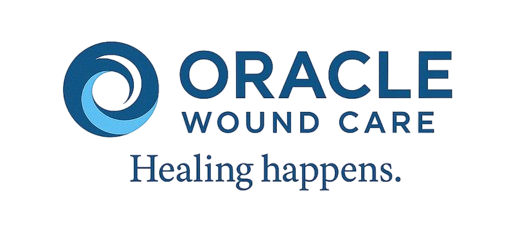The 4 Top Pain Points for U.S. Nursing Home Providers – and How Oracle Wound Care Helps Solve Them
The 4 Top Pain Points for U.S. Nursing Home Providers – and How Oracle Wound Care Helps Solve Them
The long-term care industry is facing unprecedented challenges in 2025. From mounting
financial losses and staffing shortages to increased regulatory burdens and shifting patient
preferences, skilled nursing facilities (SNFs) are under immense pressure to maintain quality
care while staying financially viable.
At Oracle Wound Care, we’ve identified the four core pain points that are threatening the
stability of SNFs and long-term care providers—and designed solutions to directly address them
through nationwide mobile and telehealth wound care services.
High Staff Turnover
Turnover rates in U.S. nursing homes are still exceeding 50%, driving up operational costs and
compromising continuity of care. The departure of trained RNs, LPNs, and aides directly
impacts care quality and increases the risk of CMS citations.
How Oracle Helps:
● We reduce workload on overburdened clinical staff by managing all wound care
assessments, documentation, and treatment
● Our NPs and wound care specialists visit in person or via telehealth, eliminating the
need for facilities to hire specialty providers
● We offer staff training and in-service education to strengthen internal care teams
Result: Fewer wounds become chronic, staff burnout is reduced, and care teams
can focus on primary duties.
Ongoing Staff Shortages
Facilities are struggling to recruit and retain licensed staff, forcing them to limit admissions, pay
premium rates for agency staff, or reduce bed availability—all of which threaten occupancy and
revenue.
How Oracle Helps:
● We become your outsourced wound care department—no need to recruit wound
care-certified staff
● Our coverage model allows facilities to scale without staffing up internally
● Telehealth wound care extends access even in rural or low-staffed settings
Result: Maintain admissions, avoid census reduction, and improve care delivery
without expanding your payroll.
Financial Pressures & Negative Margins
With occupancy below 80% in many markets, loss of pandemic funding, and CMS’s added
documentation requirements, over half of nursing homes are operating at a loss.
How Oracle Helps:
● We help facilities reduce avoidable hospitalizations that result in readmission penalties
and lost reimbursement
● Our team improves documentation and coding accuracy to maximize PDPM and Part B
revenue
● Facilities that partner with us see better survey results and fewer deficiencies, avoiding
costly fines
Result: Increased revenue retention, fewer financial penalties, and improved
MDS-driven reimbursement.
Competition from Home-Based Care
With programs like PACE and Medicare Advantage expanding, patients are increasingly opting
for in-home or community-based alternatives to institutional care.
How Oracle Helps:
● We deliver hospital-level wound care to SNFs, allowing facilities to compete on clinical
outcomes
● We help SNFs attract hospital referrals by offering advanced services that home care
may not provide
● With our nationwide mobile and telehealth footprint, facilities can extend wound care to
discharged patients and boost continuity of care
Result: Boosted occupancy, stronger referral networks, and market differentiation
through clinical excellence.
The Oracle Advantage: A Scalable, CMS-Aligned Partnership
Our solutions are designed to help SNFs and long-term care operators:
● Reduce readmissions and wound-related survey tags
● Improve patient outcomes and star ratings
● Offset staffing shortages with reliable outsourced support
● Increase PDPM reimbursement through better documentation
We work directly with SNFs, ALFs, hospice agencies, and health systems across all 50 states.
Let’s improve patient outcomes—and your bottom line—together.


